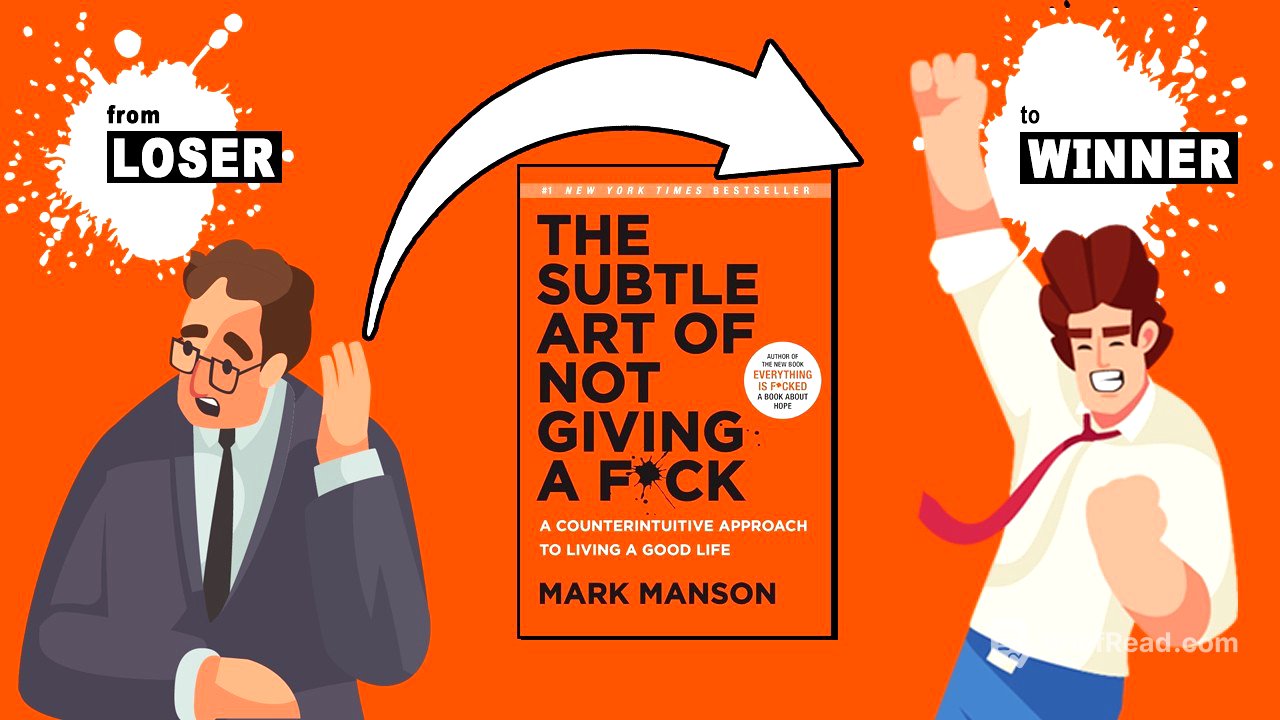TLDR;
This video summarizes key concepts from Mark Manson's "The Subtle Art of Not Giving a F*ck," focusing on how societal pressures for constant positivity can lead to dissatisfaction. It emphasizes the importance of accepting negative experiences, solving problems to achieve happiness, and understanding personal values to navigate life's challenges. The video also discusses the need to embrace failure, set boundaries, and confront the reality of death to live a more meaningful life.
- The Paradox of Positivity: Chasing more positive experiences can lead to negative outcomes.
- Happiness Through Problems: Happiness comes from solving problems, not avoiding them.
- Accepting Average: Being okay with being average frees you to focus on what truly matters.
- Values and Suffering: Our values determine the nature of our problems and the quality of our lives.
- Choosing Responsibility: Taking responsibility empowers you to control your own narrative.
- Embracing Uncertainty: Certainty is the enemy of growth; embrace uncertainty to evolve.
- Failure as Progress: Success is built on a foundation of countless small failures.
- The Power of No: Saying no is essential for defining your values and maintaining healthy relationships.
- Confronting Death: Accepting the inevitability of death gives life meaning.
Introduction [0:00]
The video introduces Mark Manson's book, "The Subtle Art of Not Giving a F*ck," as a guide to cutting through societal fluff and focusing on what truly matters in life. It highlights key concepts such as the energy-draining nature of chasing more, the idea that problems are solutions to living a better life, and the necessity of questioning one's own brain to evolve. The video encourages viewers to actively apply these ideas using an actionable blueprint linked in the description.
Chapter 1. Don't Try [0:51]
This chapter discusses the "Paradox of Positivity," where the desire for more positive experiences leads to negative feelings. Society's constant push for more popularity, attractiveness, productivity, and success creates anxiety and dissatisfaction. The chapter introduces Alan Watts's "law of reversed effort," stating that the harder we try to feel better, the worse we feel. Avoiding negative experiences only amplifies suffering. The solution is to stop chasing more, lower expectations, and focus on family, friends, and passions. This frees up energy for what truly matters, as constantly chasing more drains your resources.
Chapter 2. Happiness Is a Problem [4:09]
Happiness comes from solving problems, not avoiding them. Life is an endless series of problems, and happiness is a work in progress achieved through ongoing problem-solving. Society's push for constant positivity leads to denying or suppressing problems, which are tied to negative emotions. Some people deny problems exist, while others blame external circumstances, leading to anger and helplessness. Emotions aren't the whole picture; positive emotions can lead to suffering, and suffering is necessary for change. Growth happens when suffering is turned into productive struggle. True happiness comes from finding problems you enjoy solving, and the mindset of what pain you are willing to endure shapes your life.
Chapter 3. You Are Not Special [7:22]
The chapter challenges the notion that everyone is destined for extraordinary achievements. Most people are average in most areas of life, and society, amplified by technology, makes us feel ashamed of this. Constant exposure to exceptional events creates a toxic mindset where we believe we're falling short if we're not part of the elite. Being okay with being average frees us from constant stress and anxiety, allowing us to focus on simple, everyday joys. Accepting our non-exceptional existence allows us to appreciate basic experiences like friendships, reading, and laughter.
Chapter 4. The Value of Suffering [10:14]
Personal values play a powerful role in driving us, sometimes to extreme lengths. Instead of asking how to stop suffering, we should ask why we are suffering and what purpose it serves. Self-awareness is like an onion, with layers that bring us closer to deeper truths about who we are, what we value, and why we behave the way we do. Personal development often focuses on short-term feel-good solutions rather than digging deeper into our true values, leading to false values. Pleasure is fleeting and superficial, while true values are grounded in reality, socially constructive, immediate, and controllable. Embracing certain negative values, such as taking responsibility, acknowledging ignorance, and accepting failure, can lead to personal growth and happiness.
Chapter 5. You Are Always Choosing [16:05]
We always control how we interpret and respond to what happens to us. Choosing your problems gives you a sense of autonomy and control. William James's experiment of taking full responsibility for everything in his life transformed his mindset. While we can't always control what happens, we can control our reactions. It's easy to feel wronged, but focusing solely on fault keeps us stuck in the past. Taking responsibility shifts our mindset toward finding solutions in the present and future. Just because something isn't your fault doesn't mean you have no responsibility to handle it.
Chapter 6. You're Wrong About Everything [18:38]
The more something threatens your identity, the more you will avoid it. Memories are less reliable than we think, and our brains reshape them based on current beliefs and emotions. The constant pursuit of certainty can lead to insecurity and inflexibility. Accepting uncertainty fosters growth, allowing us to learn, evolve, and discover new possibilities. Absolute certainty is an illusion, and the harder we try to be certain, the more uncertain we feel. Embracing identity shifts allows us to grow beyond our limitations. Certainty is the enemy of growth, and embracing uncertainty opens the door to self-improvement.
Chapter 7. Failure Is the Way Forward [22:45]
Success is built on a foundation of countless small failures, and refusing to fail is refusing to grow. Society conditions us to fear failure through the school system and mass media. Pain is essential for growth and should be embraced as a catalyst for transformation. Emotions like fear, anxiety, and sadness are not inherently bad; emotional pain fuels personal development. Action can lead to motivation; when stuck, start doing something, even if unsure of the direction. Taking action first creates emotional responses and new ideas, fueling more motivation.
Chapter 8. The Importance of Saying No [25:49]
Clear boundaries are essential for maintaining healthy relationships. You cannot solve someone else's problems, and no one else can solve yours. In healthy relationships, partners take responsibility for their own emotions and actions, supporting each other's growth without trying to fix or control each other. Rejection is a crucial part of life, and avoiding it leads to long-term emptiness. True fulfillment comes from dedicating yourself to something that takes years to build, which is only possible when you learn to reject alternatives. Your identity is shaped by the things you say no to. Commitment brings clarity and freedom by eliminating distractions and anxiety.
Chapter 9. And Then You Die [29:08]
Humans are uniquely aware of their own mortality, creating the "terror of death." To cope, we create immortality projects like leaving a legacy or mastering a skill. Accepting the inevitability of death gives life meaning. Death forces us to confront life's deeper questions and think about what truly matters. The looming presence of death gives weight to our decisions and values. To truly live is to embrace the inevitability of death and stop giving a f*ck about the things that don't matter.









